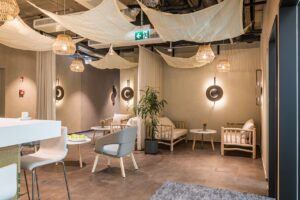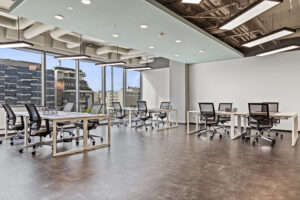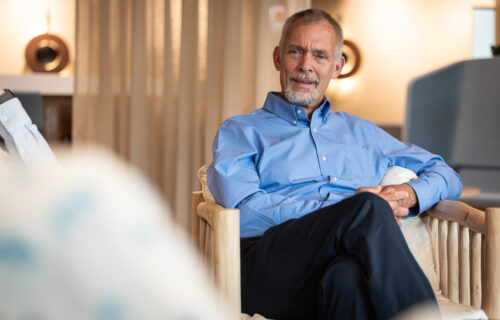

Six months after taking charge of DBH Flex, Managing Director Michael Smithing says the company is returning to its entrepreneurial roots while adapting to an office market that has changed dramatically since COVID-19. The Budapest-based flexible workspace operator, formerly known as DBH Serviced Offices, has spent the past half-year stabilising operations, re-entering regional markets, and redefining what flexibility means in Central and Eastern Europe.
“DBH has been around since 2004, but the business needed focus,” Smithing tells CIJ EUROPE. “We’ve spent the last half-year stabilising operations and responding faster to clients. That alone has improved occupancy in Budapest.” The company’s rebranding this year from DBH Serviced Offices to DBH Flex signals a strategic shift from traditional serviced space to a more adaptive model built on realistic economics and collaboration with landlords.
After consolidating its Budapest operations, DBH Flex re-entered the Romanian market, taking the entire second floor of Skanska’s Equilibrium One in northern Bucharest. The move marks a return to high-quality, energy-efficient buildings and aligns with a broader trend across the region, where developers are redesigning new schemes to incorporate flexible-space components as hybrid working continues to reshape tenant behaviour.
Smithing says DBH Flex’s approach is about adaptability rather than scale. “We don’t tie companies into five-year leases,” he explains. “They can grow or contract as their business evolves.” One client in Budapest downsized from an entire building to a 110-desk office, while another is testing a shared-service concept with fewer than 20 desks. Such examples highlight the shift toward proof-of-concept leasing, where companies validate their operational needs before committing to larger spaces. Property advisers in Budapest and Bucharest confirm that short-term leasing demand is increasing, although overall take-up remains below pre-pandemic levels as many large occupiers continue to renegotiate existing leases.
The company’s renewed focus on partnership extends to landlords, many of whom remain cautious after several operators defaulted on rent during the pandemic. Smithing believes the answer lies in profit-sharing rather than fixed leases. “If I promise a rent I can’t pay, everyone loses,” he says. “If we share both the gain and the pain, it works.” Under this approach, DBH Flex fits out vacant offices at a lower capital cost — roughly €250 per square metre, compared to the €400–€500 typical of rent-free incentive packages — and aims to fill the space faster. Whether the model delivers “full rent within a year” depends on occupancy levels that have not been disclosed, but market analysts agree that faster cash-flow generation is attractive for landlords with empty stock.
“The real risk today lies with landlords sitting on vacant second-generation buildings waiting for a tenant to pay the valuation rent they send to their bank,” Smithing says. “We work with those who understand that success comes from cashflow and occupancy. It takes about a year to create a stable Flex centre, and during that time neither the landlord nor the operator earns much. Our job is to minimise risk and generate sustainable returns.”
The continuing rise of hybrid work has blurred the lines between permanent and occasional office use. DBH Flex reports clients rotating teams through shared desks or reserving rooms part-time. “Some of our tenants use a room twice a week; others pay per day for overflow staff,” says Smithing. “The point is that no space sits idle.” Advisors at Colliers CEE note that similar rotational models are emerging in Warsaw and Prague, allowing operators to maintain occupancy despite lower daily attendance.
DBH Flex’s newer locations have also evolved in design. The older corridor-and-cubicle model has been replaced by open lounges, soft seating and private booths that encourage informal interaction without mimicking the event-driven coworking aesthetic. “We’re not trying to be a lifestyle brand,” says Smithing. “But people need a place where they feel comfortable stepping out of their office.”
Expansion is on the table, but Smithing emphasises discipline over speed. “Some buildings just won’t work economically,” he admits. “If fit-out costs are €800 per square metre, we can’t make the numbers add up. At €250, we can.” Market observers see this cautious approach as necessary in a region where older office stock often lags ESG standards and landlords face tightening margins.
When asked how technology might reshape the business, Smithing is both pragmatic and humorous. “AI will help us work faster and with fewer mistakes. It removes repetitive tasks and should make work more enjoyable. But our values — flexible, fun and fair — come from our people. AI can’t replace that. Although I’d love to see cleaning robots introduced sooner rather than later.”
Reflecting on the sector’s turbulence in recent years, Smithing says sustainability in the flex business is less about ESG metrics and more about survival through adaptability. “When the market is booming, we share the good times. When it’s tough, we share the pain. Some of the most visible failures weren’t caused by overexpansion but by inflexibility. Operators with fixed rents couldn’t give clients the flexibility they needed to survive, and that rigidity drove them away.”
DBH Flex’s guiding philosophy — “Flexible, Fun and Fair” — now serves as both cultural compass and operational strategy. Smithing believes that success in the Central-European flex market depends not on scale but on trust, partnerships and disciplined execution. “The market remains small and competitive, but measured growth gives us an edge,” he concludes. “There’s no algorithm for this business. You can’t automate trust. You have to earn it — one landlord and one tenant at a time.”
© 2025 cij.world
